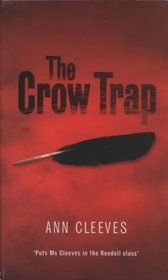Helpful Score: 2
In the North Pennines on Black Law Farm is an isolated cottage, Baikie's Cottage. Businessmen want to open a quarry nearby, and three young women are using Baikie's as a base for the environmental study they must conduct. When Rachael, the team leader, arrives at Baikie's, she discovers the body of her friend, Black Law Farm owner Bella Furness. Apparently Bella has committed suicide, and Rachael finds that impossible to accept. And when the next death occurs, a fourth woman arrives at Baikie's Cottage: Detective Inspector Vera Stanhope.
Sometimes a writer branches out into different series with varying degrees of success. Ann Cleeves is one of those writers whose books I enjoy regardless of the series of which they're a part. Cleeves' Shetland Quartet is how I first became acquainted with her talent, and once I discovered that she'd written other series, I had to try those as well.
The Crow Trap starts out at a very deliberate pace. All three young women are introduced and their back stories are given while the plot advances. The area around Baikie's Cottage feels closed off, overcast and claustrophobic, as do the young women themselves. The atmosphere itself is rank with secrecy. It's not until page 230 of The Crow Trap that Detective Inspector Vera Stanhope makes her formal appearance:
"She was a large woman-- big bones amply covered, a bulbous nose, man-sized feet. Her legs were bare and she wore leather sandals. Her square toes were covered in mud. Her face was blotched and pitted so Rachael thought she must suffer from some skin complaint or allergy. Over her clothes she wore a transparent mac and she stood there, the rain dripping from it onto the floor, grey hair sleeked dark to her forehead, like a middle-aged tripper caught in a sudden storm on Blackpool prom."
Not your usual inspector, is our Vera. Her mother died while Vera was still quite young, and she grew up with her bird-obsessed father, living with him until his death. Vera still lives in the family home close to the railway. From her many treks across the moors with her father in search of birds and other wildlife, Vera has learned the value of patience, of standing still and quiet, of observing, of listening. These skills are all put to good use during an investigation in which everyone has something they want to remain hidden.
I was in the perfect mood for this book. I wanted something with atmosphere and detail, something that unfolded slowly and steadily, something that had marvelous characterizations. Once again, Cleeves has exceeded my expectations, since I not only read a marvelous book but gained a new inspector to follow.
If you're in the mood for English mysteries with plenty of plot and personality, it would be difficult to find an author better at delivering the goods than Ann Cleeves.
Sometimes a writer branches out into different series with varying degrees of success. Ann Cleeves is one of those writers whose books I enjoy regardless of the series of which they're a part. Cleeves' Shetland Quartet is how I first became acquainted with her talent, and once I discovered that she'd written other series, I had to try those as well.
The Crow Trap starts out at a very deliberate pace. All three young women are introduced and their back stories are given while the plot advances. The area around Baikie's Cottage feels closed off, overcast and claustrophobic, as do the young women themselves. The atmosphere itself is rank with secrecy. It's not until page 230 of The Crow Trap that Detective Inspector Vera Stanhope makes her formal appearance:
"She was a large woman-- big bones amply covered, a bulbous nose, man-sized feet. Her legs were bare and she wore leather sandals. Her square toes were covered in mud. Her face was blotched and pitted so Rachael thought she must suffer from some skin complaint or allergy. Over her clothes she wore a transparent mac and she stood there, the rain dripping from it onto the floor, grey hair sleeked dark to her forehead, like a middle-aged tripper caught in a sudden storm on Blackpool prom."
Not your usual inspector, is our Vera. Her mother died while Vera was still quite young, and she grew up with her bird-obsessed father, living with him until his death. Vera still lives in the family home close to the railway. From her many treks across the moors with her father in search of birds and other wildlife, Vera has learned the value of patience, of standing still and quiet, of observing, of listening. These skills are all put to good use during an investigation in which everyone has something they want to remain hidden.
I was in the perfect mood for this book. I wanted something with atmosphere and detail, something that unfolded slowly and steadily, something that had marvelous characterizations. Once again, Cleeves has exceeded my expectations, since I not only read a marvelous book but gained a new inspector to follow.
If you're in the mood for English mysteries with plenty of plot and personality, it would be difficult to find an author better at delivering the goods than Ann Cleeves.




